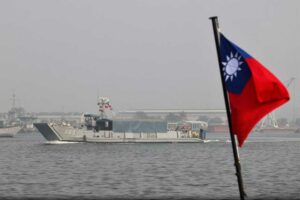THE government’s chief economic planner said the Philippines must minimize its exposure in case the geopolitical situation deteriorates, with analysts citing the potential of the China-Taiwan standoff to escalate.
“There are geopolitical risks (and) we have to live with that. That should not constrain you from planning for continued, sustained growth. We can take those. We need to be ready,” Socioeconomic Planning Secretary Arsenio M. Balisacan told reporters after the European Chamber of Commerce of the Philippines meeting last week.
“We have to identify what our vulnerabilities are and work on them. The global norm is, even if you are far away, everyone is affected. That’s the 21st century,” he added.
University of Asia and the Pacific Economist Bernardo M. Villegas said that if war breaks out between Taiwan and China, the Philippines and the rest of the Indo-Pacific region will face a disruption of both exports and imports.
China is the Philippines’ main trading partner, accounting for 22.7% of total imports in 2021. In the same year, around 15.5% of Philippine exports went to China.
Mr. Villegas, who is also a BusinessWorld columnist, has written in the newspaper that Taiwan investment in the Philippines amounts to P32.3 billion, exceeding that of China with P24.7 billion.
“In fact, over the years Taiwanese firms have poured in P32.3 billion in total investments in export-oriented enterprises in economic zones registered with the Philippine Economic Zone Authority (PEZA), mainly in electric equipment and apparatus, metal products manufacturing, as well as in the real estate sector,” Mr. Villegas wrote.
“But since our growth is mostly due to the domestic market, we will be less affected than our neighbors whose economies are very much export-oriented. Our OFW remittances and BPO-IT sectors will continue to support our economy with foreign exchange,” he said in an e-mail.
According to Gareth Leather, Senior Asia Economist for Capital Economics, further escalation will disrupt Taiwan’s exports, raising global inflation levels due to the heavy dependence on Taiwan for electronics products, including those used in the auto industry.
“Taiwan is by far the world’s biggest producer of the processor chips that are increasingly ubiquitous in new products. It has twice the market share of the next biggest producer. Its dominance at the high end is even greater: 92% of the most advanced semiconductors are made by TSMC (Taiwan Semiconductor Manufacturing Company Limited) in Taiwan,” he said in a Capital Economics publication.
Asian Institute of Management Economist John Paolo R. Rivera said an escalation will pressure global supply chains but the Philippines may catch some of the fallout because of its geographical proximity and in case it is forced to take sides should its ally, the US, come to the defense of Taiwan.
Mr. Villegas does not expect the confrontation to escalate into a shooting war.
“It will be just saber rattling. It would be advisable for us to keep friendly economic relations with both. Taiwan can continue to be a major investor in the Philippines. We can continue to be a major provider of high-value fruits to China,” Mr. Villegas said.
Manu Bhaskaran, an economist and CEO at Centennial Asia Advisors Singapore, said he sees no significant impact in the near term.
“In the near term, there might be some supply chain dislocations because of the military drills in the Taiwan Straits but this should be minor. In the long term, so long as there is no escalation in military operations, there could be some fall in business confidence which could affect economic growth in the region. But overall, I don’t see much impact,” he said in an e-mail.
Pantheon Chief Emerging Asia Economist Miguel Chanco said that it is too early to speculate about the impact on the Philippine economy.
“In any case, the country is not as reliant on external trade as its peers in the region so, even if there was to be some short-term shocks, I doubt it’ll have a material impact on the country’s growth prospects immediately,” Mr. Chanco said.
The government targets 6.5-7.5% growth this year, and 6.5-8% annual growth for next year until 2028. Gross domestic product growth averaged 7.8% in the first half.
China has extended its military drills along the east and west coasts exercise lasting only four days. Ballistic missiles have been launched, while attacks were simulated both within the skies and seas surrounding Taiwan.
The latest round of tensions was spared by US Speaker Nancy Pelosi’s visit to Taiwan, the highest-ranking official to visit Taiwan in 25 years. She said her visit is part of a “broader trip” to the Indo-Pacific region that focuses on “mutual security, economic partnership and democratic governance.” — Diego Gabriel C. Robles
